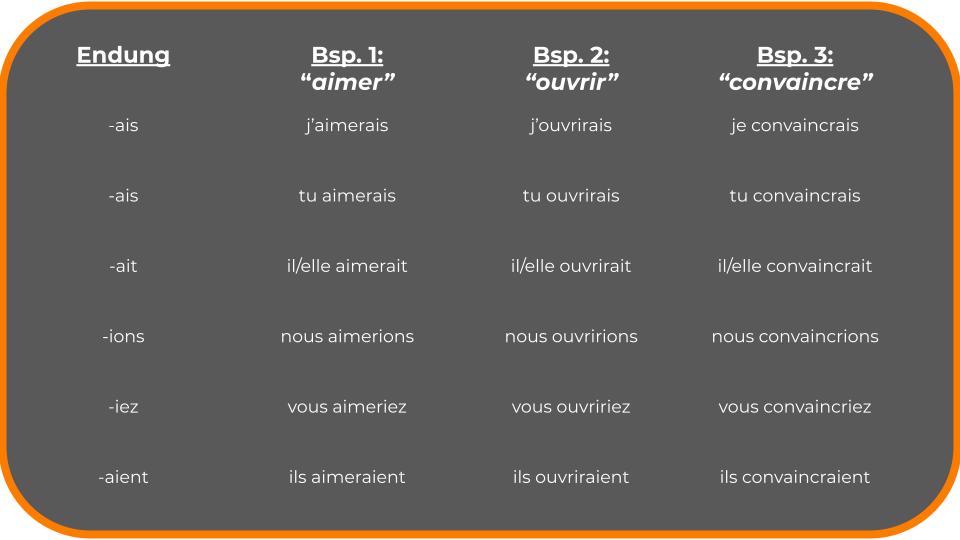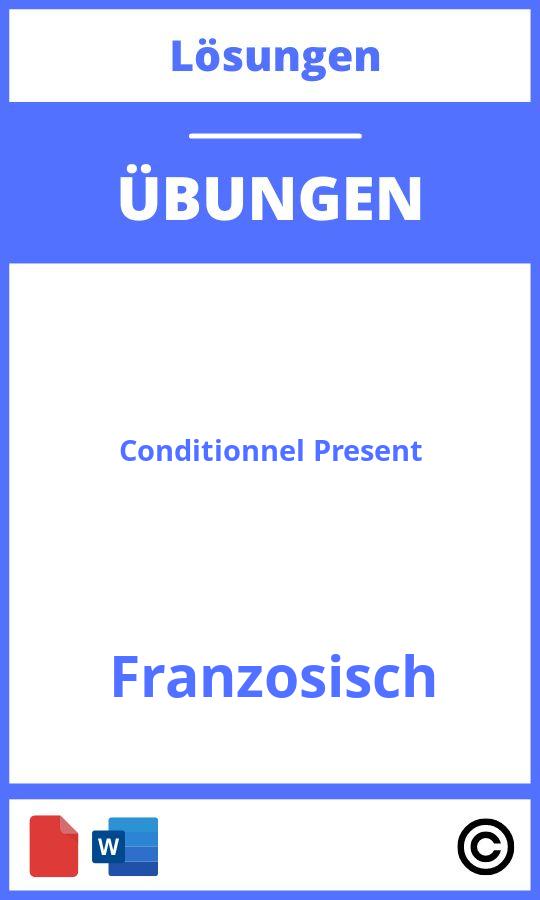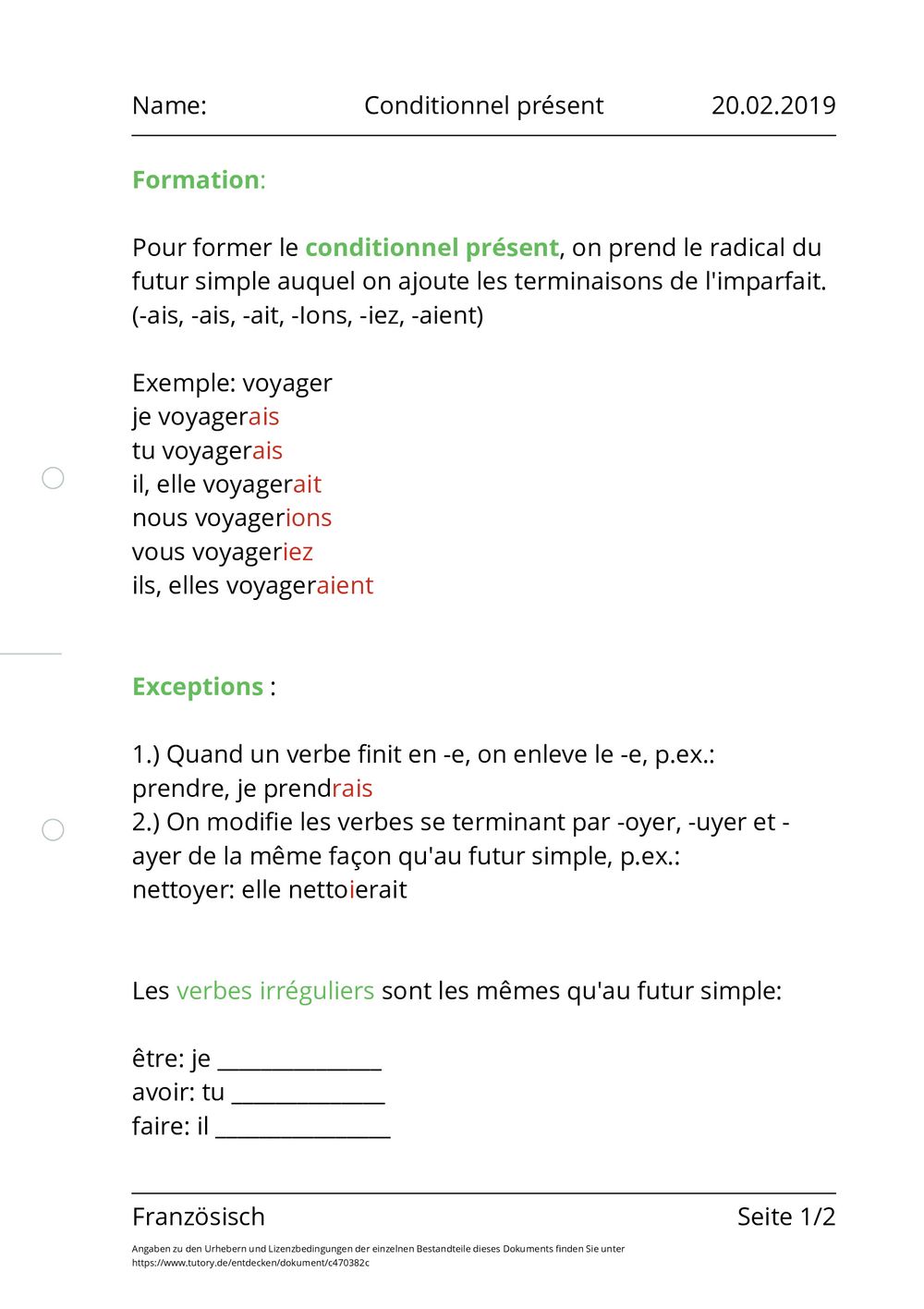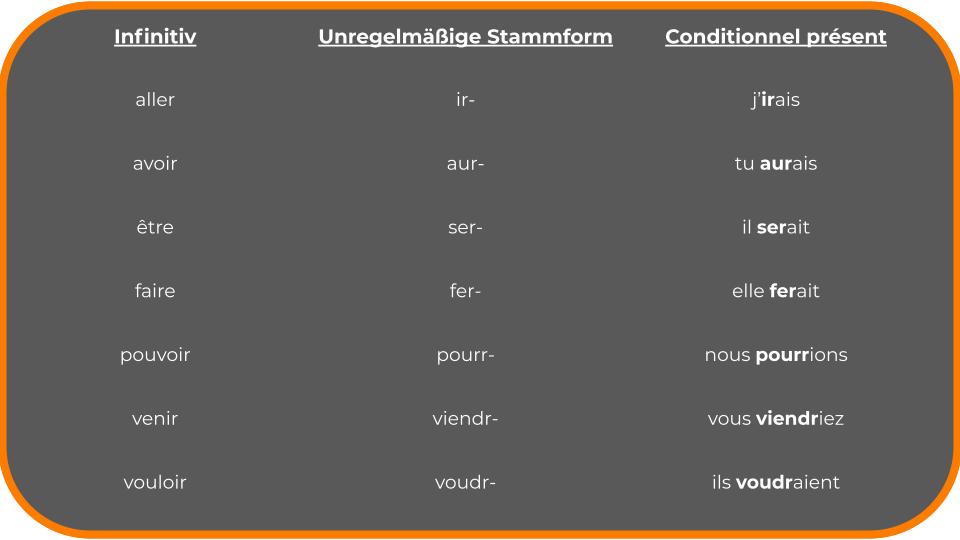
FRANZÖSISCH LERNEN = Comprendre = Conditionnel Présent YouTube
Exercise B1 Complete the gaps with the conditionnel présent of the verbs in brackets. Je pensais que tu (être) à la maison dimanche. Elle (vouloir) un nouveau vélo. Selon les sondages, les Français (boire) plus de vin que les Allemands. Est-ce que vous (pouvoir) fermer la porte? David croyait que nous (prendre) l'avion.

Conditionnel Present Und Passe Übungen PDF Französisch
French Verb Conjugation Understanding The French Conditional By Camille Chevalier-Karfis Updated: Mar 22, 2023 Let's see how verbs are conjugated in the conditional present in French (le conditionnel présent), and when we use the conditional in French versus English.

This is le conditionnel présent It is formed by using the stem of the verb used in le futur
If you've been to France or have been watching a few French TV shows, you've surely encountered le conditionnel (conditional). Est-ce que je pourrais avoir un café, s'il vous plait ? = Could I have a coffee, please? Aimeriez-vous commander un apéritif ? = Would you like to order an aperitif?

Ein Video mit Übungen zum Conditionnel présent Französisch Grammatik YouTube
How to form the French conditionnel présent. Forming the French conditionnel présent is quite simple. -ais, -ais, -ait, -ions, -iez, -aient. If the infinitive is ending in -e, you will need to remove that final -e and add the endings above. For example, let's use the verb PRENDRE.

Le conditionnel présent das Grammatikblatt Unterrichtsmaterial im Fach Französisch
The present conditional (French: le conditionnel présent) is generally used to express: The future of the past (events that, viewed from the past, take place at a later time) A polite request or a wish A possibility or assumption (with caution)

Le conditionnel présent Conditionnel présent, Verbes français, Enseignement du français
What is le présent? The present tense in French grammar (le présent) corresponds to the English simple present. It talks about facts, current situations and repeated actions in the present, as well as scheduled future actions.

Le Conditionnel présent auf Französisch Einfach erklärt! phase6 Magazin
to express a wish, a possibility, or a hypothesis in the present or the future (conditionnel présent) or in the past (conditionnel passé) Example: Michel aimerait être en vacances. as a tense to talk about the future from a past point of view Example: Michel pensait qu'il pourrait partir en voyage.

Conditionnel Present Übungen PDF Französisch
j' aur ais, tu aur ais, il aur ait, nous aur ions, vous aur iez, ils aur aient. Pouvoir. je pourr ai. je pourr ais, tu pourr ais, etc. The conditional in French is very similar to the English equivalent (using 'would'). We use it in the following situations: • To express a wish: we use the conditional with verbs like vouloir, aimer, adorer.

1 LE CONDITIONNEL PRÉSENT FORMATION Pour former le conditionnel, on suit la même règle que
Learn how to Conjugate most French verbs in the conditional present (Le Conditionnel Présent) and get fluent faster with Progress with Lawless French. Access a personalised study list, thousands of test questions, grammar lessons and reading, writing and listening exercises. Find your fluent French!

French lesson Verbe ÊTRE = Conditionnel = Présent YouTube
You will use the conditionnel présent to express a suggestion or a wish. acheter. J'achèterais cette voiture.. I would buy this car. aimer. J'aimerais rentrer chez moi. I would like to go home. In the first example someone is giving a suggestion. In the second example someone is expressing a wish.
Affiche Mémo Le conditionnel, conjugaison et utilisation Ecole Suisse Internationale
The present conditional (le conditionnel présent) Often simply called the conditional ( le conditionnel ), since this is the conditional tense we use the most often. This tense is the equivalent of "would" in English. Ex: Si nous avions un peu d'argent, nous partirions en vacances. (If we had a little money, we'd go on vacation.)

Französisch Présent Übersicht Unterrichtsmaterial im Fach Französisch Französisch
Im Französischen verwenden wir Conditionnel: zum Ausdruck eines Wunsches, einer Möglichkeit oder einer Vermutung in der Gegenwart/Zukunft (Conditionnel présent) bzw. in der Vergangenheit (Conditionnel passé) Beispiel: Michel aimerait être en vacances. als Zeit, um die Zukunft aus Sicht der Vergangenheit auszudrücken Beispiel:

Einführung des conditionnel présent (Konditional I) Unterrichtsmaterial im Fach Französisch
Das conditionnel présent ist ein Modus des Französischen. Er wird für Handlungen verwendet, die nicht mit Sicherheit stattfinden, z.B. für Wünsche oder Vermutungen. Verwendung Das conditionnel présent verwendet man für: Wünsche und Vermutungen in der Gegenwart und Zukunft Mögliche Situationen in der Zukunft aus Sicht der Vergangenheit

Arbeitsblatt Conditionnel présent Französisch tutory.de
Conditionnel Présent Demonstrativbegleiter Französisch Demonstrativpronomen Französisch Farbadjektive Französisch Fragen Französisch Fragewörter Französisch Französisch Präpositionen des Ortes Französisch Zeiten Französische Verben Futur Antérieur Futur Composé Futur Simple Gérondif Haupt und Nebensätze Französisch Hilfsverben Französisch Imparfait

FRANZÖSISCH LERNEN = Exister = Conditionnel Présent YouTube
Le Conditionnel Présent en français - [ Formation et utilisations ] Watch on The present tense of the conditional is used to express that something would hypothetically happen in the present or in the future under certain conditions.

Le Conditionnel présent auf Französisch Einfach erklärt! phase6 Magazin
This is precisely why you can be sure of one thing: you will often use le conditionnel in French. Usually translated to English using would, could, and should, the conditional is a French mood with both a present and a past tense. The primary use of le conditionnel is to talk about hypothetical events and uncertain information, whereas it's.